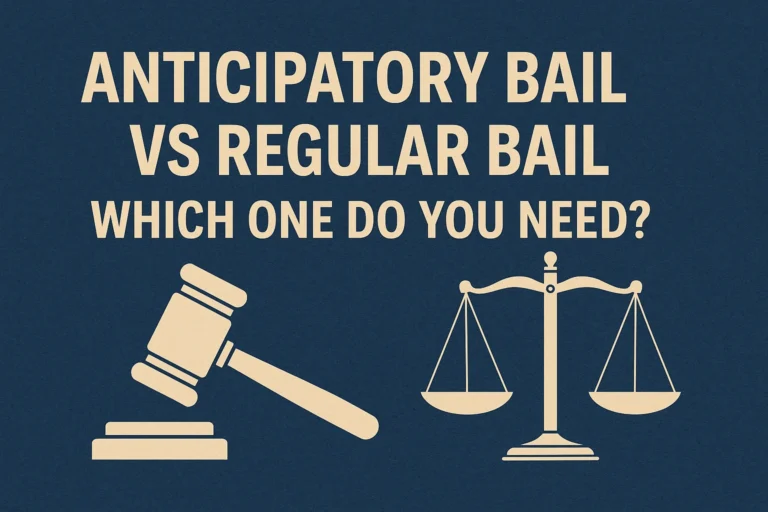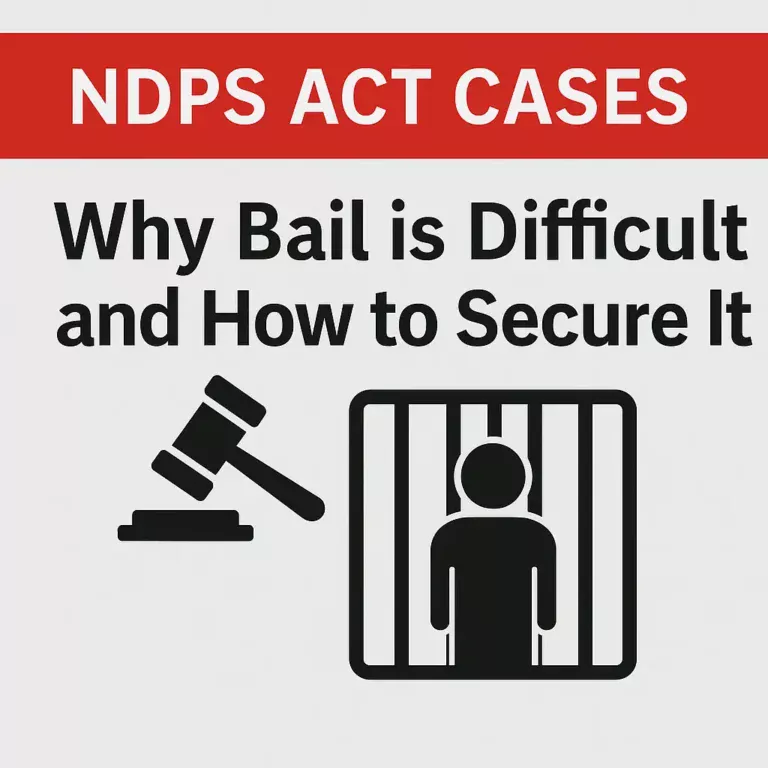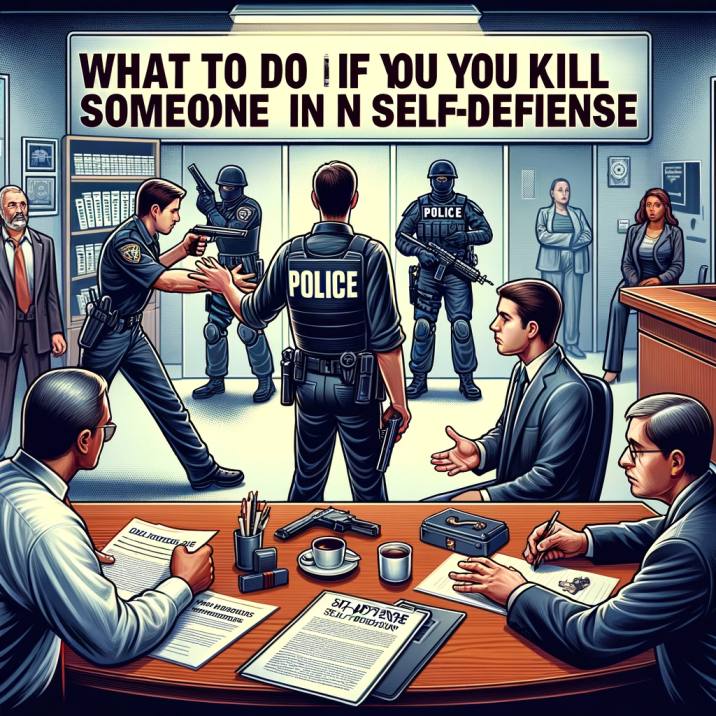Introduction
If you’re out on bail and suddenly face a threat of cancellation, it can be terrifying. But don’t panic — Indian law gives you a fair chance to defend yourself. This guide explains in simple and practical terms how to safeguard your bail, why it can be cancelled, and what steps you can take to stay protected.
What Is Bail Cancellation?
Bail means temporary release from jail under certain court-ordered conditions. Bail cancellation happens when the court decides to take back that release and send the accused back into custody. In India, courts can cancel bail under Sections 437(5) and 439(2) of the Code of Criminal Procedure (CrPC), 1973. These provisions are now replaced by Sections 480(5) and 482(2) of the Bharatiya Nagarik Suraksha Sanhita (BNSS), 2023, which similarly allow a Magistrate or a higher court (Sessions or High Court) to cancel bail if there is violation of conditions or if it is necessary in the interest of justice.This means either the same court that granted bail or a higher court can revoke it. Bail cancellation is a serious step because it affects the accused person’s liberty. Normally, courts require very strong reasons to cancel bail, not just vague allegations. A cancellation petition is usually filed by the police, the victim or complainant, or sometimes taken up by the court itself if new facts emerge. At a hearing, the court will carefully weigh evidence before deciding.
Common Reasons Why Bail Gets Cancelled
Bail is typically cancelled only for serious, concrete reasons. Some common grounds are:
- Violating Bail Conditions: Not following any rules set by the court (for example, leaving the area, not checking in with police, or skipping court dates) can trigger cancellation.
- Committing a New Crime: Being accused of a fresh offence while on bail is a strong ground for revoking bail. The law aims to prevent bail from becoming a license to repeat crimes.
- Tampering with Evidence or Witnesses: If there is proof or reasonable suspicion that the accused is threatening witnesses or hiding/destroying evidence, bail can be cancelled. This is seen as abusing the freedom granted by bail.
- Fleeing or Absconding: If the accused runs away, goes into hiding, or seems likely to escape justice, courts can cancel bail to make sure the person faces trial.
- Public Safety Threat: A court may cancel bail if the accused poses a danger to society or individuals (for example, by their violent history or the nature of the new allegations).
- Fraud or Misrepresentation: If it’s discovered that bail was obtained by hiding important facts or giving false information, the court can cancel it. Bail must be granted on full and true disclosure.
- Other Abuse of Liberty: Any clear misuse of the freedom granted—like engaging in similar criminal activities—can justify cancellation.
Courts have emphasized that bail should not be cancelled casually. Simple allegations or vague fears are not enough.
Legal Rights of an Accused During Bail Cancellation
Even if bail cancellation is being considered, the accused has important rights and protections:
- Right to Notice and Hearing: The court must give you notice of the cancellation hearing and the chance to appear. You cannot be deprived of bail without a proper hearing.
- Right to Legal Counsel: You have the right to be represented by a lawyer. Your lawyer can present your case, argue on your behalf, and make legal submissions.
- Right to Present Evidence: You can bring witnesses or documents to show you complied with bail conditions. For example, proof that you stayed in your city or attended work/school as required. This evidence can counter the cancellation case.
- Limited Jurisdiction: Only the court that granted bail (or a higher court) can cancel it. A lower court cannot arbitrarily revoke bail granted by a superior court. This rule protects against unfair interference.
- Right to Appeal or Review: If one court cancels bail, you can appeal to a higher court or seek review. For example, if a Magistrate cancels bail, you can apply to the Sessions Court or High Court for relief, and if a High Court cancels bail, the Supreme Court may be approached.
- Limited Grounds Rule: The law treats your bail as a personal liberty, so courts must follow established principles and not act arbitrarily. In other words, bail cannot be cancelled on a whim; you should be given a fair chance to contest each allegation.
How to Build a Strong Defense Against Bail Cancellation
To defend your bail, focus on proof and preparation. Key steps include:
- Keep Records of Compliance: Maintain any documents that show you followed bail terms. For example, attendance records at court, notices from police where you reported in, or proof of staying within allowed areas. Organize these in a folder to present.
- Address Each Allegation Clearly: If the cancellation petition lists specific violations, respond to each one. For example, if accused of leaving town, show travel records or explain where you were. If accused of contacting a witness, produce phone bills or witness affidavits denying contact. Provide clear evidence or explanation for every point.
- File a Counter-Affidavit: With your lawyer’s help, prepare a written statement (counter-affidavit) in court. In it, deny the allegations factually and attach supporting documents. This becomes part of the record that the judge will review. Explain any misunderstandings honestly (for instance, if you missed a court date, explain the reason).
- Show Good Behavior: Emphasize that you have complied with all conditions so far. Point out your regular court appearances, cooperation with investigation, and law-abiding activities. If you have a job, family or community ties, mention them to show you are stable and not a flight risk.
- Use Strong Witnesses: If someone can vouch for you (like your employer, respected community members or neighbors), have them ready to testify or give affidavits about your good conduct. Having credible people speak up on your behalf can strengthen your case.
- Highlight Weakness in the Opponent’s Case: If the police or complainant lacks solid evidence, make that clear. For example, if they claim witness intimidation but only have suspicion, point out the absence of proof. Your lawyer can argue that conjecture alone is not enough to cancel bail.
- Stay Available and Honest: Do not avoid communication. Attend all hearings and respond promptly to court notices. Always be truthful with the court—if you lied or withheld information earlier, the court can use that to cancel bail. Being honest and cooperative boosts your credibility.
Important Case Laws (summarized simply)
Several Indian court cases illustrate how bail cancellation is handled:
- Siddharam Satlingappa Mhetre v. State of Maharashtra (2011) – The Supreme Court cancelled an accused’s bail because there was a reasonable suspicion that he committed another serious crime while on bail.
- State of Rajasthan v. Balchand (1977) – The Supreme Court said that bail may be revoked if the accused misuses the freedom it grants.
- CBI v. P. Chidambaram (2019) – The Supreme Court stressed that courts must carefully weigh the seriousness of the charges and evidence before deciding on bail or its cancellation.
- Daulat Ram v. State of Haryana (1977) – The Supreme Court noted that once bail is granted, it should be cancelled only for “cogent and overwhelming circumstances”.
- Veerapandy v. State of Tamil Nadu (1979) – The High Court cancelled bail because the accused had violated bail terms by threatening the witness’s family.
These cases show a balance: while bail is important, it can be taken away for grave reasons. The key lesson is that cancellation requires clear proof. Courts often caution against arbitrary action and look for strong evidence of misuse before cancelling bail
Practical Tips for Court Hearings
If you have a bail cancellation hearing (or any bail-related hearing), keep these simple tips in mind:
- Be On Time and Prepared: Plan to arrive at court early. Carry all important documents in a folder: your bail order, ID, any evidence to show compliance (like address proof, employment letter, etc.). Being late or unprepared can create a bad impression.
- Dress Respectfully: Wear clean, modest clothes. In court, appearance matters. This shows respect for the judicial process.
- Stay Calm and Polite: Sit quietly and listen to the proceedings. When speaking to the judge, do so calmly and clearly. Use respectful address (“Sir/Madam” or “Your Honor”). Do not interrupt others.
- Silence Your Phone: Turn off your mobile phone or keep it on silent. Avoid any distractions like chewing gum or looking around. Focus on what is being said.
- Follow Courtroom Etiquette: Stand when the judge enters or addresses you, and sit when told. If the judge or lawyers ask you a question, stand or speak only when recognized. Always refer to the judge as a presiding authority.
- Answer Clearly and Truthfully: If asked a question, answer honestly. Keep your answer brief and factual. If you don’t understand something, politely ask for clarification instead of guessing. Never lie in court—false statements can cost you bail.
- Let Your Lawyer Speak: Mostly, let your lawyer handle arguments. You can add points if needed, but it’s often better to answer questions than to argue. Your lawyer knows legal nuances and will guide the conversation.
- Bring Notes if Allowed: Prepare a list of points you want to convey or questions for your lawyer. However, don’t read a script in court—use notes as a backup.
- Stay Organized: If you have any physical evidence (photos, records), hand them to your lawyer before the hearing so they can submit them properly.
- Remain Respectful Throughout: Even if the discussion gets tense, keep your tone polite. Reacting angrily or disrespectfully to the judge or prosecutor can harm your case.
Overall, showing that you are responsible and respectful can positively influence the court’s view. Small things like punctuality and manners reinforce the message that you can be trusted to follow court orders.
Role of a Good Lawyer
A skilled criminal lawyer can make a huge difference in defending against bail cancellation. Here’s how a good lawyer helps:
- Legal Guidance and Strategy: Your lawyer will explain what to expect in the bail cancellation hearing and advise you on the best defense strategy. They know which arguments work and which won’t.
- Building Your Case: The lawyer gathers evidence (documents, witness statements) and frames legal arguments to show why your bail should not be cancelled. They prepare and file all necessary paperwork (like counter-affidavits and petitions) on time.
- Court Representation: In the courtroom, the lawyer speaks on your behalf. They will present your evidence clearly, question witnesses, and respond to the prosecution’s claims. Their training enables them to argue effectively according to legal rules.
- Expert Knowledge of Law: Experienced lawyers know important laws and precedents related to bail. For example, they will stress that “courts require cogent proof” before cancelling bail. They can cite relevant case laws (like the ones above) to strengthen your position.
- Protecting Your Rights: A lawyer ensures the court follows due process. For instance, they will object if proper notice wasn’t given or if your right to be heard is being ignored. They will remind the judge of your presumption of innocence and the limits on cancelling bail.
- Quick Appeal Actions: If bail is cancelled, a good lawyer will immediately start the appeal process. They know the appropriate higher court to approach and the deadlines to meet, speeding up your chance to get bail back.
- Negotiation and Mediation: Sometimes a lawyer can negotiate with prosecutors. For example, if the evidence is weak, they might arrange for witnesses to clarify facts or agree to stricter bail conditions instead of full cancellation.
- Emotional Support and Advice: Facing bail cancellation is stressful. A lawyer provides reassurance and practical advice (like advising you to remain calm and explaining what questions to expect), which helps you stay focused on the defense.
In short, you should see a lawyer as your partner. They handle the legal complexities, so you can focus on following the bail conditions and gathering evidence. Hiring an experienced criminal defense lawyer greatly improves your chances of keeping your bail and freedom.
What to Do If Bail Is Cancelled
If the court does end up cancelling your bail, act quickly and carefully:
- Stay Calm and Contact Your Lawyer: First, consult your lawyer immediately. They will explain the implications and your options. Panicking will only hurt your ability to think clearly.
- Follow the Order: If the cancellation order is final, you will likely have to surrender to custody. Do this peacefully – resisting or hiding will only make things worse.
- Plan Your Next Legal Step: Usually, you can ask a higher court to review the cancellation. For example, if a Magistrate cancelled your bail, appeal to the Sessions Court or High Court. If the High Court cancelled it, your lawyer might file a special leave petition in the Supreme Court. Time is crucial, so these applications should be filed without delay.
- Apply for Bail Again: You can also try applying for bail again. Sometimes, after a cancellation, new facts (like more evidence or time passed) can be presented to get bail once more. This is more likely to work in a higher court. Your lawyer will prepare a fresh bail petition explaining why you now deserve bail.
- Ask for Interim Relief: In some cases, your lawyer might request an interim stay on the cancellation order while the appeal is heard. This is like asking the higher court to pause the cancellation temporarily, so you remain out of jail until a decision.
- Gather New Evidence (if any): If new facts have come to light since the cancellation, collect evidence. For example, if the cancellation was due to alleged witness tampering but that is disproved, get affidavits from those witnesses. Present these in your appeal.
- Manage Personal Matters: If you must go to jail, make personal arrangements in advance (like informing family, handling work/family responsibilities). Also ensure your rights in jail are respected and follow jail rules – good behavior in custody can support future bail pleas.
- Stay Informed and Patient: Appeals can take time. Keep communicating with your lawyer about court dates and progress. Patience is important, but also be proactive – attend hearings and comply with any new bail terms set by the higher court.
- Learn from the Experience: Finally, understand what led to the cancellation so you can avoid similar issues. If it was due to a misunderstanding, clarify it; if due to strict bail conditions, know what to do differently next time. This will help if you have to apply for bail again or in any future case.
Even if your bail is cancelled now, there is still a process for regaining it. The key is to act without delay, rely on legal remedies (appeals and fresh bail applications), and maintain a respectful and law-abiding approach throughout.
Conclusion
Facing bail cancellation can be overwhelming, but you are not helpless. The law offers multiple safeguards, and with the right preparation and legal support, you can effectively defend your freedom.
Whether it’s complying with bail conditions, gathering evidence, or appealing against cancellation — the key is to act early, stay organized, and remain truthful.
📄 Download Your Free Checklist
Need a quick reference?
✅ Download the Bail Cancellation Defense Checklist in PDF format — designed for easy printing and courtroom use.
Created by Vishal Saini, Advocate
📥 Click here to download the checklist (PDF)
❓ Frequently Asked Questions (FAQs)
-
What is bail cancellation?
It is when a court revokes an earlier bail order and directs the accused to be taken back into custody. -
Can a court cancel bail without any complaint?
Yes, if the court finds that bail conditions are being violated or justice is at risk. -
Is bail cancellation a common process?
No, it’s an exceptional measure used only when necessary. -
What is the standard for cancelling bail?
There must be cogent and overwhelming circumstances, such as threat to witnesses or a new offence. -
Which courts can cancel bail?
The court that granted bail or a higher court. -
Can the Magistrate cancel bail granted by Sessions Court?
No, only a higher or the same court can cancel its own bail order. -
What is Section 437(5) CrPC?
It allows Magistrates to cancel bail if new justified reasons emerge. -
What is Section 439(2) CrPC?
It empowers Sessions or High Court to cancel bail. -
What is Section 480(5) BNSS?
This new provision mirrors Section 437(5) CrPC for Magistrates under the BNSS. -
What is Section 482(2) BNSS?
This is the BNSS version of Section 439(2) CrPC allowing higher courts to cancel bail. -
Can complainants file for bail cancellation?
Yes, if they have valid and strong grounds. -
Does a new FIR lead to automatic bail cancellation?
Not automatically, but it can be a major factor. -
Can bail be cancelled for missing court dates?
Yes, especially if it’s a repeated violation. -
Can bail be cancelled for threatening witnesses?
Yes, it’s one of the most serious grounds for cancellation. -
Is re-arrest immediate after cancellation?
Yes, unless interim protection is granted by another court. -
Can anticipatory bail be cancelled?
Yes, using the same provisions as regular bail. -
Can regular bail be converted to anticipatory bail after cancellation?
No, a fresh anticipatory bail application must be filed. -
Can High Court entertain cancellation after Magistrate rejection?
Yes, the High Court has revisional powers. -
Is bail cancellation appealable?
Yes, you can appeal to a higher court. -
Can cancellation be stayed?
Yes, through an application for interim relief. -
Does a criminal record increase risk of cancellation?
Yes, especially with multiple prior offences. -
What is a counter affidavit in bail matters?
A formal written reply denying the cancellation allegations. -
Can character certificates help prevent cancellation?
Yes, particularly when issued by credible persons. -
Is absconding a valid ground for bail cancellation?
Yes, it reflects misuse of liberty. -
Can bail be cancelled on WhatsApp evidence?
Yes, if it shows threat, planning or tampering. -
Is cancellation harder if bail is granted by High Court?
Yes, but not impossible with compelling proof. -
Can cancellation be filed after chargesheet?
Yes, at any stage during trial. -
Can media reports lead to bail cancellation?
Not without supporting legal evidence. -
Are there deadlines to file cancellation?
No statutory deadline, but filing early is strategic. -
Can civil disputes affect criminal bail?
Only if directly linked to the criminal offence. -
Is compromise a reason for cancellation?
Not usually, unless it violates bail terms. -
Can victims move Supreme Court for cancellation?
Yes, through a Special Leave Petition. -
Can minors apply for bail cancellation?
Yes, through guardians or legal representatives. -
Can FIR quashing stop cancellation?
Yes, if the FIR is quashed, cancellation becomes moot. -
Can trial judges cancel bail?
Yes, if violations or new facts arise. -
Is change in investigating officer a ground for cancellation?
Not by itself, but can support a broader claim. -
Does trial delay affect bail status?
No, it usually strengthens the case for continued bail. -
Can social media misuse lead to cancellation?
Yes, if posts breach bail terms. -
Can moving to another city cancel bail?
Yes, if it breaches location-specific bail conditions. -
Is financial hardship a reason for cancellation?
No, financial issues don’t justify cancelling bail. -
Can surety withdrawal cause bail cancellation?
Not directly; court may seek a new surety instead. -
Can bail be re-applied after rejection?
Yes, in a higher forum or with changed circumstances. -
Is social media activity monitored under bail?
Yes, if it’s part of the bail terms. -
Is criminal intimidation a ground for cancellation?
Absolutely, especially against complainants or witnesses. -
What if bail is cancelled unfairly?
You can file an appeal or revision petition. -
Can court deny bail again after cancellation?
Yes, particularly if the previous liberty was misused. -
Can medical reasons stop cancellation?
Sometimes, if supported with strong medical proof. -
Are women given leniency in bail cancellation?
Gender is a consideration but not a shield. -
Can bail be cancelled during police custody?
Rarely arises, but legally possible. -
Can bail terms be modified to avoid cancellation?
Yes, by moving an application before the same court. Yes, by applying for modification of bail conditions.
📚 Sources and References
📜 Statutory Provisions
- Code of Criminal Procedure, 1973 (CrPC):
- Bharatiya Nagarik Suraksha Sanhita, 2023 (BNSS):
- BNSS Full Text – PRS India (PDF)
(Refer to Sections 480(5) and 482(2) within the document)
- BNSS Full Text – PRS India (PDF)
⚖️ Landmark Case Laws
- Dolat Ram v. State of Haryana (1995) – Cogent and overwhelming reasons required for cancellation
- Siddharam Satlingappa Mhetre v. State of Maharashtra (2011) – Bail is the rule, jail the exception
- CBI v. P. Chidambaram (2019) – Bail cancellation denied by Supreme Court
















